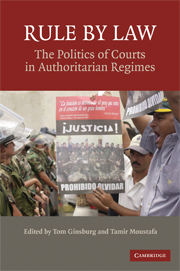Book contents
- Frontmatter
- Contents
- Contributors
- Introduction: The Functions of Courts in Authoritarian Politics
- 1 Of Judges and Generals: Security Courts under Authoritarian Regimes in Argentina, Brazil, and Chile
- 2 Administrative Law and the Judicial Control of Agents in Authoritarian Regimes
- 3 Singapore: The Exception That Proves Rules Matter
- 4 Agents of Anti-Politics: Courts in Pinochet's Chile
- 5 Law and Resistance in Authoritarian States: The Judicialization of Politics in Egypt
- 6 Courts Out of Context: Authoritarian Sources of Judicial Failure in Chile (1973–1990) and Argentina (1976–1983)
- 7 Enforcing the Autocratic Political Order and the Role of Courts: The Case of Mexico
- 8 The Institutional Diffusion of Courts in China: Evidence from Survey Data
- 9 Building Judicial Independence in Semi-Democracies: Uganda and Zimbabwe
- 10 Judicial Power in Authoritarian States: The Russian Experience
- 11 Courts in Semi-Democratic/Authoritarian Regimes: The Judicialization of Turkish (and Iranian) Politics
- 12 Judicial Systems and Economic Development
- 13 Courts in Authoritarian Regimes
- References
- Index
3 - Singapore: The Exception That Proves Rules Matter
Published online by Cambridge University Press: 05 June 2012
- Frontmatter
- Contents
- Contributors
- Introduction: The Functions of Courts in Authoritarian Politics
- 1 Of Judges and Generals: Security Courts under Authoritarian Regimes in Argentina, Brazil, and Chile
- 2 Administrative Law and the Judicial Control of Agents in Authoritarian Regimes
- 3 Singapore: The Exception That Proves Rules Matter
- 4 Agents of Anti-Politics: Courts in Pinochet's Chile
- 5 Law and Resistance in Authoritarian States: The Judicialization of Politics in Egypt
- 6 Courts Out of Context: Authoritarian Sources of Judicial Failure in Chile (1973–1990) and Argentina (1976–1983)
- 7 Enforcing the Autocratic Political Order and the Role of Courts: The Case of Mexico
- 8 The Institutional Diffusion of Courts in China: Evidence from Survey Data
- 9 Building Judicial Independence in Semi-Democracies: Uganda and Zimbabwe
- 10 Judicial Power in Authoritarian States: The Russian Experience
- 11 Courts in Semi-Democratic/Authoritarian Regimes: The Judicialization of Turkish (and Iranian) Politics
- 12 Judicial Systems and Economic Development
- 13 Courts in Authoritarian Regimes
- References
- Index
Summary
“The foundations for our financial center were the rule of law, an independent judiciary, and a stable, competent, and honest government that pursued sound macroeconomic policies.”
–Lee Kuan Yew (2000: 73)Unlike many authoritarian systems, the Republic of Singapore holds regular elections; Western media circulates widely; the Internet has deep penetration; and even Lee Kuan Yew – Singapore's paramount leader, who served as prime minister for more than 30 years – insists that adherence to the rule of law and a scrupulous, efficient, consistent judicial system are and have been essential to Singapore's spectacular growth and development. An island without adequate fresh water to serve its population, Singapore has risen to be a robust international commercial center that consistently outranks rivals ranging from Hong Kong and Japan to its own former colonial master, Great Britain, and, even in some years, the United States itself on measures of international competitiveness, economic vitality, and its efficient, effective, and reliable judicial system. And yet, unlike so many other authoritarian systems, Singapore has avoided the pitfalls of judicialization that arise in so many other states considered in this volume. Singapore seems to offer glimmering, shimmering proof that a government can construct a rule-of-law system sufficient to satisfy the demands of a global economy and maintain domestic support in regular elections for more than forty years without being forced to tolerate the tradeoff of uncontrolled, independent judicial power, or significant political opposition.
- Type
- Chapter
- Information
- Rule by LawThe Politics of Courts in Authoritarian Regimes, pp. 73 - 101Publisher: Cambridge University PressPrint publication year: 2008
- 26
- Cited by

